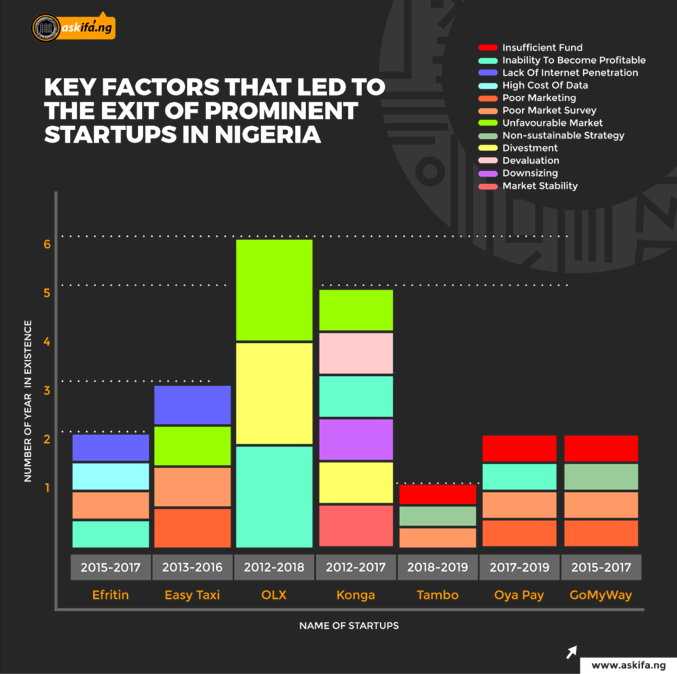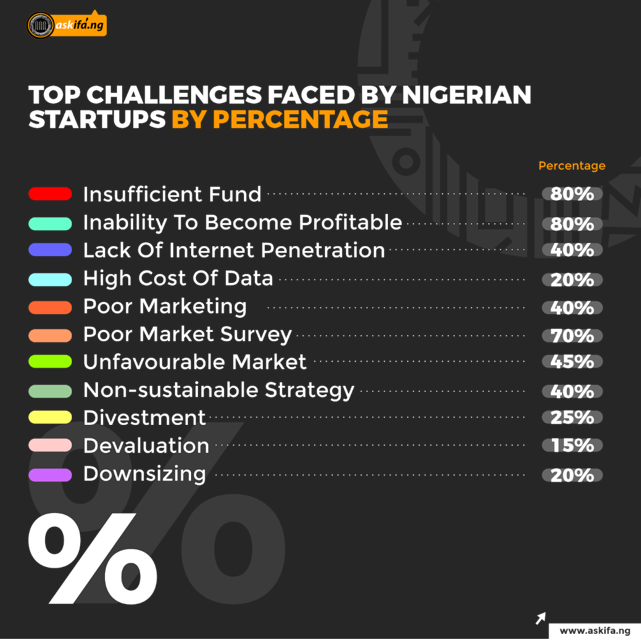
Africa, particularly Nigeria, has become a hub for both investors and new businesses, despite the numerous failures of startups in the country.
The country has experienced substantial growth in investment and business development, spanning across various sectors including E-commerce, mobile technology, and fintech startups.
However, many new businesses struggle to survive the initial stage and often end up either relocating, shutting down, or being acquired by a third-party company.

Several prominent companies from the internet era, such as OLX, Efritin, Fero, Wiko, Wechat, Tambo Mobile, and Easy Taxi, have faltered at the fundamental stage in Nigeria due to various reasons.
These businesses faced common issues leading to their failure, including insufficient market research, inefficient use of investor funds, inability to achieve profitability, mismanagement of resources, and lack of employee confidence.
Unfortunately, some existing startups with promising potential are still following the same path to failure. This article aims to examine these businesses, past and present, and shed light on the key issues leading to their eventual downfall.
Efritin
Owned by the Swedish company Saltside Technologies, Efritin launched as a classified advertisement website in Nigeria in August 2015 but failed to sustain its presence in the country beyond the second year. The high cost of data and poor internet penetration were major contributing factors to its demise.
Efritin also faced internal challenges, including accusations of fund mismanagement, ultimately leading to its inability to secure additional funding for further expansion.
Furthermore, a lack of market survey compounded its challenges, as similar online classified platforms like OLX were also struggling in Nigeria at the time.
Easy Taxi
After receiving a $10 million seed funding, Easy Taxi, a ride-hailing service, expanded to Nigeria in 2013 but ceased operations in the country after three years due to difficulties in penetrating the challenging Nigerian market.
Despite having significant stakeholders such as Rocket Internet, MTN, and Millicom, Easy Taxi struggled to adapt to the Nigerian market and eventually exited.
OPay
OPay, a fintech and multi-service company, has been grappling with profitability since its establishment in Lagos, Nigeria, in August 2018. The company’s over-reliance on financing and lack of sustainable business strategies have posed significant challenges.
Additionally, external factors such as regulatory changes by the Lagos State Government, leading to a ban on Okada (motorcycle taxis) in major roads, have further impacted OPay’s operations.

In a recent report by research website Hindenberg, Opera, the parent company, was accused of various misconducts, adding to the challenges faced by OPay. Employee welfare issues and the underperformance of its mobile brand OLLA have further compounded its struggles.
Many other startups may be following a similar path. It is essential for new businesses to prioritize sustainable plans and efficient recruitment strategies to improve their chances of success.
This article is brought to you by Askifa.ng
Askifa.ng is a Technology-focused news website, and its primary aim is to demystify the ideology behind technology, an alternative to saying simplifying technology. While our primary focus is to dish out tech stories and breaking news; we also have a keen interest in Startups across respective fields, and we don’t hesitate to put up stories about latest development in the space
